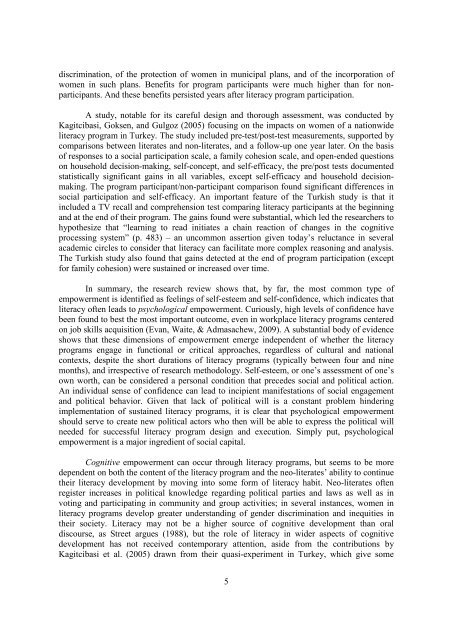Literacy and empowerment: a contribution to the ... - unesdoc - Unesco
Literacy and empowerment: a contribution to the ... - unesdoc - Unesco
Literacy and empowerment: a contribution to the ... - unesdoc - Unesco
You also want an ePaper? Increase the reach of your titles
YUMPU automatically turns print PDFs into web optimized ePapers that Google loves.
discrimination, of <strong>the</strong> protection of women in municipal plans, <strong>and</strong> of <strong>the</strong> incorporation ofwomen in such plans. Benefits for program participants were much higher than for nonparticipants.And <strong>the</strong>se benefits persisted years after literacy program participation.A study, notable for its careful design <strong>and</strong> thorough assessment, was conducted byKagitcibasi, Goksen, <strong>and</strong> Gulgoz (2005) focusing on <strong>the</strong> impacts on women of a nationwideliteracy program in Turkey. The study included pre-test/post-test measurements, supported bycomparisons between literates <strong>and</strong> non-literates, <strong>and</strong> a follow-up one year later. On <strong>the</strong> basisof responses <strong>to</strong> a social participation scale, a family cohesion scale, <strong>and</strong> open-ended questionson household decision-making, self-concept, <strong>and</strong> self-efficacy, <strong>the</strong> pre/post tests documentedstatistically significant gains in all variables, except self-efficacy <strong>and</strong> household decisionmaking.The program participant/non-participant comparison found significant differences insocial participation <strong>and</strong> self-efficacy. An important feature of <strong>the</strong> Turkish study is that itincluded a TV recall <strong>and</strong> comprehension test comparing literacy participants at <strong>the</strong> beginning<strong>and</strong> at <strong>the</strong> end of <strong>the</strong>ir program. The gains found were substantial, which led <strong>the</strong> researchers <strong>to</strong>hypo<strong>the</strong>size that “learning <strong>to</strong> read initiates a chain reaction of changes in <strong>the</strong> cognitiveprocessing system” (p. 483) – an uncommon assertion given <strong>to</strong>day’s reluctance in severalacademic circles <strong>to</strong> consider that literacy can facilitate more complex reasoning <strong>and</strong> analysis.The Turkish study also found that gains detected at <strong>the</strong> end of program participation (exceptfor family cohesion) were sustained or increased over time.In summary, <strong>the</strong> research review shows that, by far, <strong>the</strong> most common type of<strong>empowerment</strong> is identified as feelings of self-esteem <strong>and</strong> self-confidence, which indicates thatliteracy often leads <strong>to</strong> psychological <strong>empowerment</strong>. Curiously, high levels of confidence havebeen found <strong>to</strong> best <strong>the</strong> most important outcome, even in workplace literacy programs centeredon job skills acquisition (Evan, Waite, & Admasachew, 2009). A substantial body of evidenceshows that <strong>the</strong>se dimensions of <strong>empowerment</strong> emerge independent of whe<strong>the</strong>r <strong>the</strong> literacyprograms engage in functional or critical approaches, regardless of cultural <strong>and</strong> nationalcontexts, despite <strong>the</strong> short durations of literacy programs (typically between four <strong>and</strong> ninemonths), <strong>and</strong> irrespective of research methodology. Self-esteem, or one’s assessment of one’sown worth, can be considered a personal condition that precedes social <strong>and</strong> political action.An individual sense of confidence can lead <strong>to</strong> incipient manifestations of social engagement<strong>and</strong> political behavior. Given that lack of political will is a constant problem hinderingimplementation of sustained literacy programs, it is clear that psychological <strong>empowerment</strong>should serve <strong>to</strong> create new political ac<strong>to</strong>rs who <strong>the</strong>n will be able <strong>to</strong> express <strong>the</strong> political willneeded for successful literacy program design <strong>and</strong> execution. Simply put, psychological<strong>empowerment</strong> is a major ingredient of social capital.Cognitive <strong>empowerment</strong> can occur through literacy programs, but seems <strong>to</strong> be moredependent on both <strong>the</strong> content of <strong>the</strong> literacy program <strong>and</strong> <strong>the</strong> neo-literates’ ability <strong>to</strong> continue<strong>the</strong>ir literacy development by moving in<strong>to</strong> some form of literacy habit. Neo-literates oftenregister increases in political knowledge regarding political parties <strong>and</strong> laws as well as invoting <strong>and</strong> participating in community <strong>and</strong> group activities; in several instances, women inliteracy programs develop greater underst<strong>and</strong>ing of gender discrimination <strong>and</strong> inequities in<strong>the</strong>ir society. <strong>Literacy</strong> may not be a higher source of cognitive development than oraldiscourse, as Street argues (1988), but <strong>the</strong> role of literacy in wider aspects of cognitivedevelopment has not received contemporary attention, aside from <strong>the</strong> <strong>contribution</strong>s byKagitcibasi et al. (2005) drawn from <strong>the</strong>ir quasi-experiment in Turkey, which give some5
















